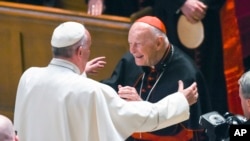Disgraced former U.S. cardinal Theodore McCarrick is almost certain to be defrocked in the next few weeks over allegations against him, including sexual abuse of minors, two Vatican sources said.
Last July, McCarrick became the first Catholic prelate in nearly 100 years to lose the title of cardinal. The allegations against him date back to decades ago when he was still rising to the top of the U.S. Church hierarchy.
McCarrick, 88, has responded publicly to only one of the allegations, saying he has "absolutely no recollection" of an alleged case of sexual abuse of a 16-year-old boy more than 50 years ago.
McCarrick's canon lawyer, J. Michael Ritty, and his civil lawyer, Barry Coburn, both declined to be interviewed for this article. The Vatican said a "canonical process" was taking place and that there would be no comment until it ends.
Pope Francis, who has the final say in the case, wants it completed before heads of national Catholic churches meet at the Vatican from Feb. 21-24 to discuss what is now a global sexual abuse crisis, three sources said.
The meeting offers a chance for him to respond to criticism from victims of abuse that he has stumbled in his handling of the crisis and has not done enough to make bishops accountable. "It (the defrocking of McCarrick) would be like a trophy to show that the pope is indeed serious about dealing with this.
That is the process that seems to be unfolding," said Kurt Martens, professor of canon law at the Catholic University of America in Washington.
McCarrick, who rose to be an important power broker in the American Church as Archbishop of Washington, D.C. from 2001 to 2006, has already received one of the most severe punishments short of defrocking. When the pope accepted his resignation as cardinal last July, he also ordered him to refrain from public ministry and live in seclusion, prayer and penitence.
A month earlier, American Church officials said the allegations that McCarrick sexually abused a 16-year-old-boy were "credible and substantiated."
One Vatican source with knowledge of the Vatican proceedings said it would be stunning if the pope did not dismiss McCarrick from the clergy, a process known as "laicization."
"I don't know what the alternative would be," another source said.
He and the other Vatican sources spoke on the condition of anonymity because they are not authorized to discuss the case. One of the sources said that if he is defrocked, McCarrick will be the highest profile Roman Catholic figure to be dismissed from the priesthood in modern times.
Defrocking would mean McCarrick could no longer call himself a priest or celebrate the sacraments, although he would be allowed to administer to a person on the verge of death in an emergency. Confined to Kansas friary
McCarrick has been confined to a Franciscan friary in a tiny town in remote northern Kansas.
In the past few weeks the top officials of the Vatican's Congregation for the Doctrine of the Faith (CDF), which handles sexual abuse cases, have been reviewing documentation and testimony about McCarrick, two of the Vatican sources said.
This is part of what is known as an "administrative process," which is much more streamlined than a full canonical trial. It is the path taken when there is an abundance of clear evidence, one of the Vatican sources said.
The procedures can result in a defrocking decree from the CDF, signed by its prefect Cardinal Luis Francisco Ladaria and approved by the pope. The pope, who is the Church's supreme legislator, can also decide to take over the dossier personally and rule on it himself.
A papal ruling could not be appealed. A decree by the CDF could be appealed within 60 days. A third possibility is that the pope could approve a CDF decree but shorten the appeals time so that the case is over before the bishops' meeting in February.
Briefing reporters on Wednesday about the upcoming meeting, Vatican spokesman Alessandro Gisotti said the pope wants the bishops to "understand laws to be applied, take necessary steps to prevent abuse, care for victims, and make sure that no case is covered up or buried."
A Vatican source confirmed that McCarrick was accused of sexual misconduct involving a child, sexual misconduct involving an adult, and solicitation.
Solicitation is a separate crime under canon law and refers to when a priest uses the pretext of the sacrament of confession to commit an immoral act with a penitent.
Separately, several priests and ex-priests have come forward alleging McCarrick used his authority to coerce them to sleep with him when they were adult seminarians studying for the priesthood.
McCarrick has not commented publicly on these allegations. Pope Francis ordered a "thorough study" last year of all documents in Holy See offices concerning McCarrick. The four U.S. dioceses where he served — New York, Metuchen, Newark, and Washington, D.C. — have launched independent investigations.
On Monday, Archbishop Carlo Maria Vigano, who last August accused the pope of covering up for McCarrick, issued a letter urging McCarrick to publicly repent for his "sins, crimes and sacrileges," saying such a gesture would bring "healing to a gravely wounded and suffering Church."





